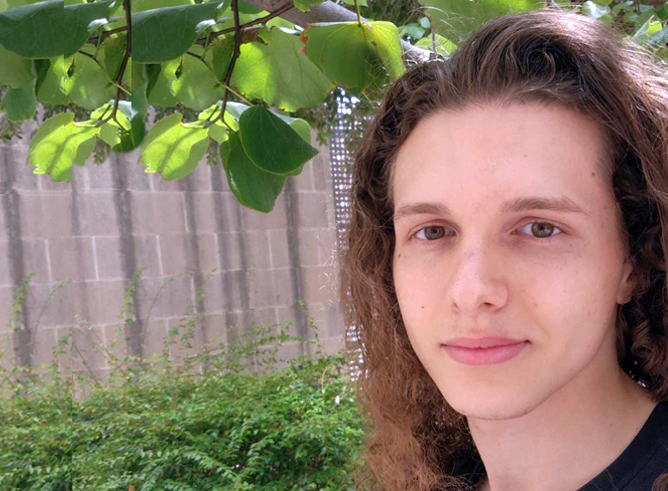
Is Pinocchio a “real” boy? What makes someone “real?" And who gets to decide?
Questions like these are increasingly being explored in popular culture as artificial intelligence (AI) becomes more prevalent in everyday life. In mainstream movies like M3GAN (a 2022 horror film) and Ron’s Gone Wrong (an animated children’s film from 2021), content creators grapple with ideas about the ethical challenges and the possible benefits and threats presented by this rapidly advancing technology. Will artificially intelligent robots make our lives immeasurably better…or will they doom us all?
As society plays with these concepts in science fiction, questions about AI also ripple across college campuses: who owns work created by AI? Is it ethical to use AI to create content? Is work created by AI less valuable than work created by humans?
“As an academic, I’m trying to embrace and work to understand this golden age of AI we are entering,” said Leonardo C.S. Martins ’24, a senior English major from Katy, Texas. During his final semester before he pursues graduate studies, Martins has been continuing a collaboration with Dr. James Francis, a senior lecturer in the Department of English at Texas A&M University who specializes in children's literature and film studies. They are working together to review media that explores ideas around AI, specifically AI in simulated youth, where a child or a childlike creation has advanced capabilities of some kind, though may remain in other ways “innocent.” They have been working on the project for the past year and hope to have a book-length work developed from this material eventually.
The project grew out of Martins’s career ambition to be a college professor and researcher. He approached Francis and asked to be mentored through a research project to understand the process from initial question to publication. Francis is doing most of the writing on this project but working closely with Martins as he conducts textual analysis of primary and secondary sources. Francis’s other published research has frequently focused on science fiction and horror, so this project is a natural extension.
"I grew up watching a lot of sci-fi cinema, constantly seeing stories unfold about pairing concepts of youth with AI,” Francis said.
"These were mostly films projecting a Pinocchio tale-type about the desire to become more human and, simultaneously, a look into how humanity has become so mechanical. When we were thinking about putting the research project together, I thought this would be a natural fit because of my study in the genre, the continuing discussions and creative productions about the subject matter, and the oddity of not too many scholars examining it. The texts are a unique mix housed under the umbrella of sci-fi but also extend into other areas of horror, children's literature and fantasy. It's a great opportunity for both a professor and student to join forces to explore a rather untapped field and offer what we hope will be a critical contribution of academic scholarship."
This science doesn’t have a limit. We will have fully aware computers at some point. It’s important to reckon with how this technology will impact humanity. AI is no different from many other scientific advancements throughout history that bring moral and philosophical challenges.
Martins has appreciated doing the research for this project. He acknowledges the list of films to review is long and that some films have more entertainment value than others. (The Iron Giant gets a big thumbs up, while Martins describes Cody the Robosapien as heavy on relevant layers for critical analysis but light on research-audience appeal.) Depending on the film, Martins might watch it multiple times, taking notes on the filmmaker's themes, motifs and rhetorical choices. “The most difficult part has been narrowing down the research,” Martins explained, as there is an enormous amount of material that could be included in this project, including the theoretical and philosophical underpinnings of the films, many of which can be traced back to earlier stories and myths.
“AI continues to be a topic of high interest in so many industries, and the film industry consistently offers stories that focus on how AI integrates with human life, replaces aspects of humanity, threatens the social order and so much more,” Francis said. “This creates a backlog of primary texts for us to examine for their relevance and credibility in application to this research study.”
While the influence of AI on society has intensified since the introduction of ChatGPT in 2022, Martins notes that society has been exploring ideas about advancing technology for a long time, as the earliest known example of science fiction is from Ancient Rome.
As the conversation around AI in society evolves, Martins says this research project will only continue to gain relevance for him as a person as well as an academic. “This science doesn’t have a limit," he added. "We will have fully aware computers at some point. It’s important to reckon with how this technology will impact humanity. AI is no different from many other scientific advancements throughout history that bring moral and philosophical challenges.”
Experience Undergraduate Research
Students in the College of Arts and Sciences at Texas A&M University work on the frontiers of discovery, even as undergraduates. As a vital component of this high-impact experience, they partner with faculty, graduate students and fellow researchers to solve cutting-edge problems, publish results in leading journals, and gain technical and critical-thinking skills that prepare them for their future careers. Learn more about undergraduate research opportunities in ArtSci.
